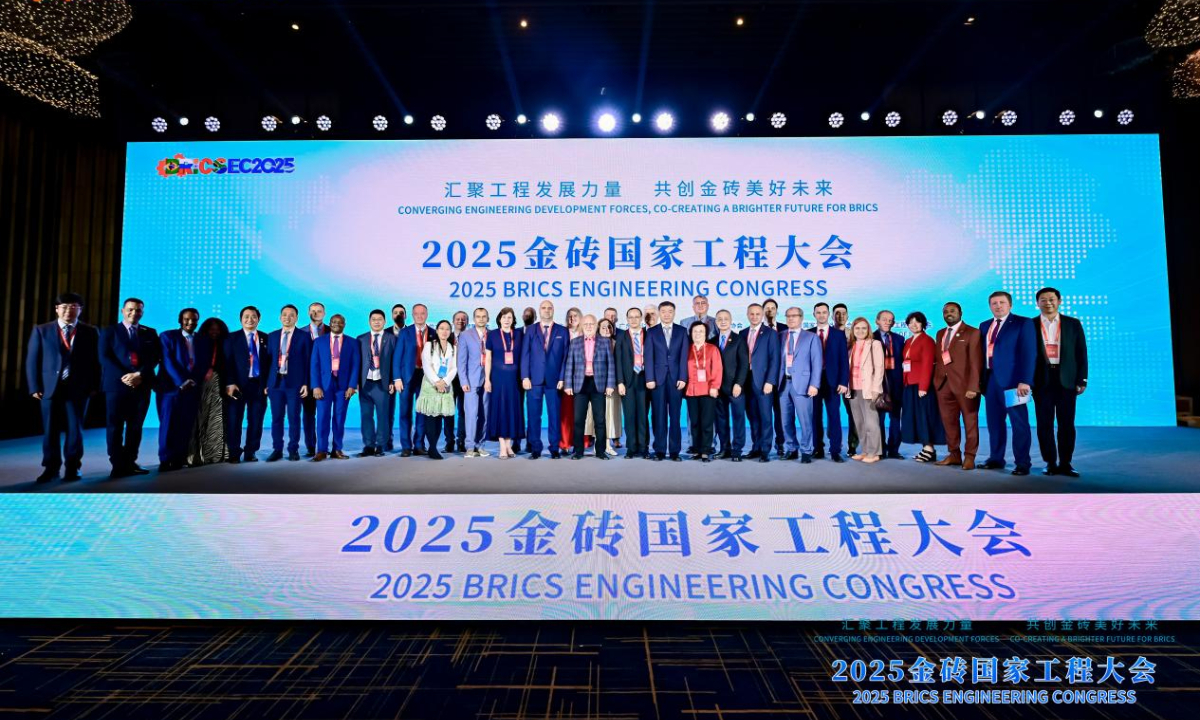2025 BRICS Engineering Congress held in Shenzhen to foster cooperation

Photo: Courtesy of 2025 BRICS Engineering Congress organizer
The 2025 BRICS Engineering Congress is taking place from Thursday to Saturday in Shenzhen, located in Guangdong Province, South China. Under the theme "Converging Engineering Development Power, Creating a Bright Future for BRICS," the congress aims to provide a platform for engineers, scholars, policymakers, and industry leaders from BRICS nations to exchange insights, promote pragmatic cooperation in engineering, and position BRICS as a leading force in global governance reform.
Guided by the Chinese Society of Engineers (CSE) and hosted by the Harbin Institute of Technology, Guangdong Association for Science and Technology, and Heilongjiang Association for Science and Technology, the congress has attracted over 200 representatives from engineering organizations, societies, universities, enterprises, and governments across BRICS and partner countries, including Brazil, Russia, China, South Africa, Egypt, the United Arab Emirates, Ethiopia, Malaysia, Thailand, Belarus, Kazakhstan, Uzbekistan, and Uganda.
The opening ceremony featured speeches from guests including Mustafa Shehu, President of the World Federation of Engineering Organizations, and Luo Hui, Executive Secretary and Director General for International Affairs of the China Association for Science and Technology (CAST) and Vice Chairperson and Joint Secretary General of the CSE.
The 2025 BRICS Engineering Congress seeks to establish a platform for exchange and mutual learning among the engineering communities of BRICS nations, enhancing openness, trust, and cooperation, Luo said. She noted that CAST, as China's largest scientific and technological community and promotion organization, connects the scientific and engineering sectors through its extensive organizational network.
CAST and CSE are dedicated to deepening collaboration in engineering within the BRICS framework, aiming to work alongside engineering organizations from BRICS countries to advance engineering education reform, foster technological innovation, promote engineering capacity building, and optimize governance in engineering, so that engineering can better benefit the people of BRICS countries, she said.
Several significant outcomes were achieved during the congress, including a memorandum of understanding on the establishment of the BRICS Engineers' Competence Building Center (Harbin, China), the initiative to launch Federation of Engineering Institutions of BRICS, and the CSE's continuing professional development resources open to BRICS engineering organizations. These initiatives aim to unify the strengths of engineering organizations within BRICS, enhance comprehensive cooperation in the engineering sector, and amplify their influence in global engineering governance.
Experts presented technical reports and engaged in themed roundtable discussions on pressing topics such as engineering education, core competencies of engineers, international recognition, continuing professional development, and technological innovation in key areas. During the dialogue on "Construction and Development of Engineering Education," held on Friday, international experts discussed the challenges posed by the latest technological revolution and industrial transformation to engineering education. They reached a consensus on the necessity to reconstruct the engineering education curriculum and strengthen the integration of industry, academia, and research.
At the closing ceremony on Friday, the Shenzhen Declaration was unveiled, in which engineering organizations from BRICS and partner countries pledged to establish an efficient and pragmatic cooperation mechanism.
On Saturday, attendees visited landmark enterprises and projects in Shenzhen, including BYD and the Hong Kong-Zhuhai-Macao Bridge. Through immersive workshops led by senior engineers from Shenzhen, they gained in-depth insights into cutting-edge achievements in intelligent manufacturing, new-energy vehicles, and super engineering innovation technology. The visits created a platform for technical insights and industry dialogue among academia, industry, and research, promoting the deep integration and value transformation of industry innovation resources.
Participants in the 2025 BRICS Engineering Congress believe that the event will unlock cooperation potential in the engineering sector among BRICS countries, offering practical pathways for mutual recognition of technical standards, talent mobility, and knowledge exchange among young engineers. This collaborative momentum from the Global South is expected to play a crucial role in promoting the establishment of the Federation of Engineering Institutions of BRICS and positively contribute to the economic growth, trade exchanges, cultural interactions, and sustainable development of BRICS nations, they said.
Source: https://www.globaltimes.cn/page/202504/1332901.shtml
